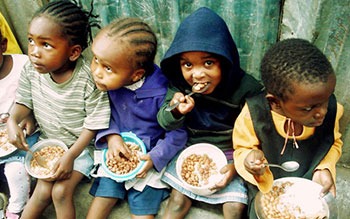Establishing a food-secure world is one of the major challenges at the forefront of international development as the pressures of population growth, climate change and urbanization have steadily increased. The World Health Organization maintains that food security exists “when all people at all times have access to sufficient, safe, nutritious food to maintain a healthy and active life.” This includes both physical and economic access to food that meets dietary needs. Food security remains a highly complex issue, linking health, the environment, economic development and trade.
The world’s population is expected to reach 9.6 billion by 2050. Many governments have begun to remodel their approach to ensuring access to food and are developing programs that highlight the importance of strengthening supply chains and eliminating food waste. Nutrition has also become a focus of the global development agenda as both malnutrition and obesity cause serious health problems in addition to economic ones. The challenge of food security comes with a number of controversial issues, such as genetically modified crops, land grabbing, corruption and conflict.

Credit: The Post Harvest Project
With food security taking center stage, Devex launched its “Feeding Development” campaign at the beginning of July, publishing articles throughout the month to break down various aspects of the issue such as environmental challenges, land rights, supply chains and nutrition. Similarly, National Geographic is investigating ways to feed 9.6 billion people in its eight-month series “The Future of Food: How to feed our growing planet.” The series examines ways to produce more food without overwhelming the planet, covering topics such as food waste, aquaculture, meat production and land grabbing.
The debate of how to feed a growing population often includes the pros and cons of using large, industrial farms or small, organic farms to produce more food. Experts insist that the issue is not black and white and that we can benefit from both. However, nutritional value and genetically modified crops raise a number of difficult questions, as do conflicts surrounding the land rights of small farmers. To complicate things further, the impact on the environment always needs to be taken into consideration.
Below are three Global Washington member organizations that are addressing food security directly.
Oxfam America is perhaps best known for its work on food security and finding ways to feed the estimated 1 billion undernourished people of the world. With the belief that empowering small-scale farmers is essential to fighting poverty, hunger and food insecurity, Oxfam works with its partners to influence the U.S. government and demand solutions to hunger that prioritize small producers. Oxfam has also designed its own programs to address the root causes of food insecurity, such as low agricultural productivity, marginalization of women farmers and unequal access to financial services and natural resources. These programs train farmers in improved agricultural techniques, strengthen farmer associations and cooperatives and support women in building savings.
Landesa focuses on securing land rights for the world’s poorest people. Land rights remain closely linked to food security because smallholder farmers who feel their land is secure are more likely to invest in the long-term development of their land and resources. Landesa researches laws, regulations and customs in the regions they work, and then develop proposed changes to the laws and regulations to strengthen farmers’ rights to land. They go on to educate officials and the public about the necessary changes and assist with the implementation of them.
The Post Harvest Project works to reduce food waste by improving the efficiency of supply chains. Their holistic assessment of food waste throughout the different stages of the supply chain identifies problem areas, and then the organization works with partners to implement technology and human capital-based solutions in those areas. Improved processes of harvest, preservation and distribution will reduce food waste, strengthen food security and increase economic opportunities.
These organizations, like other Global Washington members, recognize that much work remains to be done in order to overcome the challenges that our world faces in feeding our growing population.
1 http://www.who.int/trade/glossary/story028/en/
2http://www.unfpa.org/pds/trends.htm
3https://www.devex.com/news/global-food-security-why-it-affects-us-all-83805
4https://www.devex.com/news/4-issues-that-matter-in-nutrition-83949
5https://www.devex.com/news/how-to-feed-our-planet-without-devastating-the-environment-83799
6http://ngm-beta.nationalgeographic.com/2014/07/articles/the-next-breadbasket/
7https://www.devex.com/news/food-security-is-land-security-83863